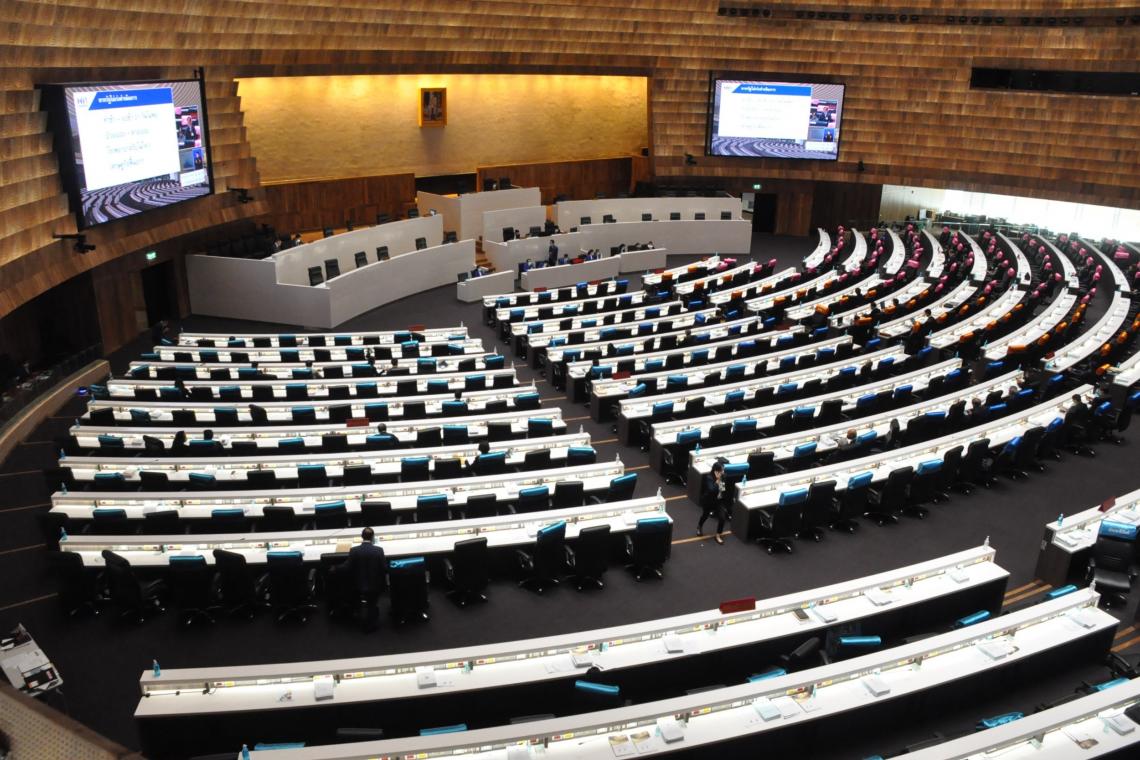Efforts to criminalise state-sanctioned acts of torture and enforced disappearance have ebbed and flowed over the past decade. While the draft act just approved by the legislature is not without shortcomings, lawmakers finally managed to pass the bill, despite political turbulence.

The Thai parliament (File photo)
In a House of Representatives meeting on 24 August, 287 of 289 elected representatives voted in favour of the Draft Act on Prevention of Torture and Enforced Disappearance. It was an amended version of the bill that was sent back from the appointed Senate two weeks ago. Of the two remaining votes, one was an abstention and the other a nay.
During the meeting, Rangsiman Rome, a parliamentarian (MP) from the Move Forward Party (MFP) reportedly expressed disappointment over three aspects of the senate-amended version, noting that: it made the appointment of an anti-torture and enforced disappearance commission the responsibility of bureaucrats as opposed to parliament; stripped the committee of its authority to inspect detention sites; and decreased jail term punishments from 40 to 20 years.
Recognising that parliament was running out of time, the MFP lawmaker agreed to swallow his objections and let the law pass.
Adilan Ali-ishak, a Palang Pracharath Party (PPRP) MP from Yala, said that despite the amendments, the law still retained the core principles of the version previously passed by the lower house. He added that it would definitely improve public access to justice, especially in the Deep South, where insurgents have been battling with the authorities for more than 16 years.
Under emergency decrees imposed over the past decade, reports have periodically surfaced of torture, enforced disappearance, and death while in the military custody.
Having been approved by parliament, the bill now passes to Prime Minister Gen Prawit Wongsuwan, the Constitutional Court having just ordered that Gen Prayut Chan-o-cha step down while it deliberates a petition filed by opposition party MPs to enforce an 8 year term limit. From the Prime Minister, it will go to the King for his signature and will come into force 120 days after being published in the Royal Gazette.
Following the parliamentary vote, nine Civil Society Organisations (CSOs) signed an open statement, expressing gratitude for the bill’s passage. They called upon state authorities to enforce the law in line with its terms and in keeping with the international conventions that Thailand has agreed to.
They also expressed hope that any problems arising in the implementation process will be addressed to improve the new law.
The passage of this act has been a long process. Although Thailand became a signatory to the Convention Against Torture and Other Cruel, Inhuman, or Degrading Treatment or Punishment in 2007 and signed off on the Convention for the Protection of All Persons from Enforced Disappearance in 2012, the first attempt to pass implementing legislation did not come until 2014.
Thereafter, the legislative process shuffled back and forth between the junta-appointed National Legislation Assembly and the Ministry of Justice until September 2021, when a draft bill based upon a proposal from a CSO was finally submitted to Parliament along with 3 other bills from the Democrat Party, the Prachachart Party, and the House Committee on Legal Affairs, Justice, and Human Rights.
Recognised as the best version, the combined draft passed the lower house only to be amended in the Senate as it currently is. During the Senate debate, senators could be seen voicing out concerns that the officials would find it difficult to enforce the lower house version bill.
Despite its flaws, the law will provide clear legal benchmarks to end the impunity that state authorities have exercised due to the absence of formal statutes banning the use of torture to extract information and confessions, and prohibiting state involvement in enforced disappearances.
Since the 2014 coup, nine activists living in self-imposed exile have been forcibly disappeared. Two were later found dead. The United Nations Working Group on Enforced or Involuntary Disappearances 2020 report notes 75 outstanding cases of enforced disappearance in Thailand.
Prachatai English is an independent, non-profit news outlet committed to covering underreported issues in Thailand, especially about democratization and human rights, despite pressure from the authorities. Your support will ensure that we stay a professional media source and be able to meet the challenges and deliver in-depth reporting.
• Simple steps to support Prachatai English
1. Bank transfer to account “โครงการหนังสือพิมพ์อินเทอร์เน็ต ประชาไท” or “Prachatai Online Newspaper” 091-0-21689-4, Krungthai Bank
2. Or, Transfer money via Paypal, to e-mail address: [email protected], please leave a comment on the transaction as “For Prachatai English”
